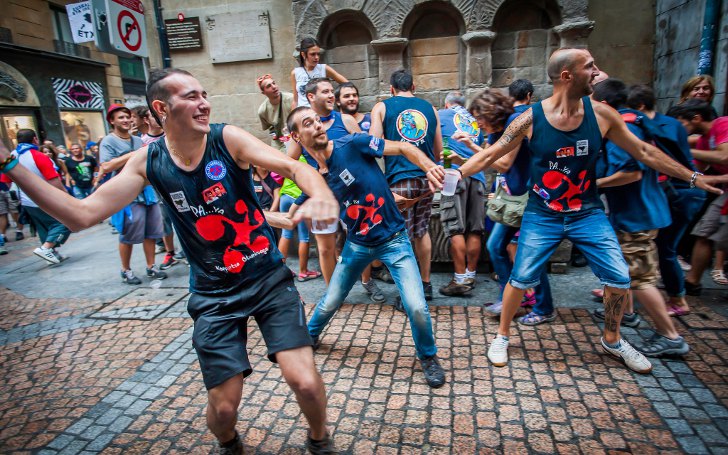The inaugural Great Week was held in 1978. It featured traditional dance performances, bullfights, boxing matches, and a large fair. The festival has been held annually ever since. The only exception was the year 1983, when the event was suspended because of a severe flood. The Great Week of Bilbao begins on the first Saturday after August 15 (the feast of the Assumption of Mary) and lasts for nine days.
The Great Week is the result of the joint effort of various party groups, called comparsas in Spanish (the same term is used in the Spanish-speaking countries for the groups that take part in carnivals) or konpartsak in Basque. Currently, there are 28 comparsas in Bilbao. The oldest ones have participated in the festivities since the very first Great Week. During the year, they also take part in the Mardi Gras Carnival and Saint Thomas Fair.
The Great Week is opened by the herald called “chupinera”. The herald is chosen from the female members of the comparsa that had won the lottery held by the festival organizers. She is responsible for launching the rocket announcing the beginning of the festivities (known as the txupinazo). The herald wears a special uniform similar to the uniform worn by the Carlist troops during the siege of Bilbao.
The official symbol of the Great Week is Marijaia. It is a figure of a plump lady with her arms raised as if she’s dancing. Marijaia makes her grand entrance onto the balcony right after the rocket is fired and accompanies the festivities throughout the festival. On the final evening, however, the figure is burned.
Music is one of the most important parts of the festival. Various concerts take place throughout the entire Great Week. The line-up includes both local artists and international acts. Renowned musicians who have performed in Bilbao over the years include Baccara, Coldplay, Guano Apes, Iggy Pop and The Stooges, Juanes, Manu Chao, Pet Shop Boys, Primal Scream, Pet Shop Boys, Safri Duo, The Prodigy, and many others.
The program of the festival also includes traditional Basque music and dancing, Basque rural sports such as stone carrying and wood chopping, special events and activities for kids, bullfights, nightly fireworks competitions, and more.

Photo: Bilboko Konpartsak




